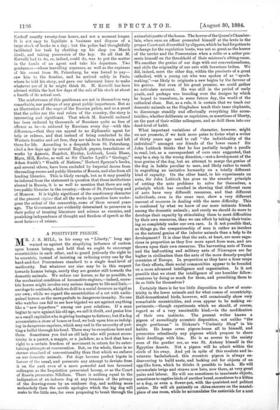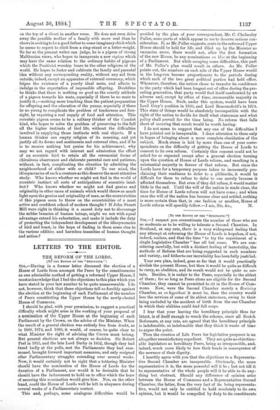A POSITIVIST PIGEON.
MR. J. S. MILL, in his essay on "Liberty," long ago warned us against the stupifying influence of custom upon human beings, and held that we ought to encourage eccentricities in each other, and to guard jealously the right to be eccentric, instead of insisting on reducing every one by the hard-and-fast Procrustean standard to a single dead-level of mediocrity. But whatever our sins may be in this respect towards human beings, surely they are greater still towards the domestic animals. We reduce our horses, so far as possible, to the mechanical condition of locomotive-engines,—indeed, eccen- tric horses might involve very serious dangers to life and limb,— our dogs to sentinels, which we drill to a social decorum as rigid as our own ; while we regard the eccentricities of a cat with undis- guised horror, as the mere prelude to dangerous insanity. No one who watches can fail to see how bigoted we are against anything like a " new departure" among our poor relations. If a man begins to save against his old age, we call it thrift, and praise him as a small capitalist who is giving hostages to fortune; but if a dog accumulates a store of bones or food, we look upon him as indulg- ing in dangerous caprices, which may end in the necessity of put- ting a bullet through his bead. There may be exceptions here and there. Sometimes you find an old lady who will protect eccen- tricity in a parrot, a magpie, or a jackdaw, as a bird that has a right to a certain freedom of movement in return for its enter- taining attempts at conversation. But, on the whole, there is no sterner standard of conventionality than that which we enforce on our domestic animals. Pet dogs become perfect bigots in favour of the usual, and persecute any attempt to deviate from it on the part even of a more powerful and less favoured colleague. as the Inquisition persecuted heresy, or as the Court of Russia persecutes Nihilism. There is nothing equal to the indignation of an indoors dog at any invasion of the privacy of the drawing-room by an outdoors dog, and nothing more melancholy than the servile apologies which the big dog will make to the little one, for even proposing to break through the
animal etiq uette of the house. The horror of the Queen's Chamber- lain, when once an officer presented himself at the lev6e in the proper Court suit diversified by slippers, which he had forgotten to exchange for the regulation boots, was not so great as the horror of the terrier and the Pomeranian when a collie or a setter pre- sents himself on the threshhold of their mistress's sitting-room. We smother the genius of our dogs with our conventionalisms, and stifle the originality of our cats with luxurious bribes. We did, indeed, meet the other day, within the precincts of a great cathedral, with a young cat who was spoken of as " epoch- making,"—as likely to originate a new hegira by the fervour of his genius. But even of his great promise, we could gather no articulate account. He was still in the period of early youth, and perhaps was brooding over the designs by which he hoped to transform, in some future day, the world of the cathedral close. But, as a rule, it is certain that we teach our domestic animals as the Singhalese teach their tame elephants, to discourage steadily and effectually everything like eccen- tricities, whether deliberate or capricious, or assertions of liberty, on the part of their wilder colleagues, and so drill them into our dead-level of habit.
What important variations of character, however, might we not promote, if we took more pains to foster what a writer of thirty years ago used to call " the individuality of the individual" amongst our friends of the lower races ? Sir John Lubbock thinks that he has partially taught a poodle to read, but, as a correspondent of ours once suggested, that may be a step in the wrong direction,—not a development of the true genius of the dog, but an attempt to merge the genius of the dog in habits peculiar to man, and likely rather to result in engrafting an imitative humanity on a totally different kind of capacity. On the other hand, in his experiments on ants, Sir John Lubbock has gone on the sounder principle of setting the ants problems to solve for themselves, a principle which has resulted in showing that different races of ants have very differeilt resources, and that different individuals, even in the same race, show a very different amount of resource in dealing with the same difficulty. This is confirmed by what we know of our more intimate friends among the domestic animals ; and surely we should do more to develope their capacity by stimulating them to meet difficulties by their own resources, than we can effect by taking their train- ing so completely under our own care. Is it not possible that, as things go, the companionship of man is rather an incubus on the natural genius of the inferior animals than a help to its development? It is clear that the ants, at least, are more saga- cious in proportion as they live more apart from man, and are thrown upon their own resources. The harvesting ants of Texas and the leaf-cutting and military ants of Nicaragua are far higher in civilisation than the ants of the more densely-peopled countries of Europe. In proportion as they have a freer scope for their efforts, their social communities appear to be founded on a more advanced intelligence and organisation. Is it not possible that we stunt the intelligence of our humbler fellow- creatures by doing so much for them, and permitting them to do so little for themselves ?
Certainly there is far too little disposition to allow of eccen- tricity in the lower animals and for what comes of eccentricity. Half-domesticated birds, however, will occasionally show very remarkable eccentricities, and even appear to be making ex- periments,—though experiments which we should, of course, regard as of a very unscientific kind,—in the modification of their own instincts. The present writer knows a pigeon of exceedingly eccentric disposition, not unlike "the single gentleman" in Dickens's "Curiosity Shop" in his habits. He keeps seven pigeon-boxes all to himself, and persecutes relentlessly any pigeons which propose to share their dwellings with him. He is as averse to the society even of the gentler sex, as was St. Antony himself in the Egyptian deserts. Not a pigeon will he admit within the circle of his sway. And yet in spite of this resolute and in- veterate bachelorhood, this eccentric pigeon is always en- deavouring to build nests, and looking out for objects of an egg-like form, which be thinks it possible to batch. He will accumulate twigs and straws now here, now there, at very great pains and labour. He will coo sometimes to inanimate objects, sometimes to captive birds of another breed, sometimes to a kitten or a dog, or even a flower-pot, with the quaintest and politest antics. He will sit patiently on china-saucers on the mantel- piece of one room, while he accumulates the materials for a nest
on the top of a closet in another room. He does not even drive away the possible mother of a family with more zeal than he shows in seeking to be a good father to some imaginary chick which he seems to expect to elicit from a ring-stand or a letter-weight. So far as the present writer can judge, he is a pigeon of strong Malthusian views, who hopes to inaugurate a new regime which may have the same relation to the ordinary habits of pigeons which the Positivist worship bears to the other religions of the world. He hopes to foster and cultivate the family and parental idea without any corresponding reality, without any aid from outside, indeed, except an apparatus of external ceremony, which feigns the existence of a purely ideal mate, and affects to indulge in the expectation of impossible offspring. Doubtless he thinks that there is nothing so good as the courtly attitude of a pigeon towards his mate, especially if there be no mate to justify it ;—nothing more touching than the patient preparation for offspring and the education of the young, especially if there be no young to complicate the problem of tenderness and fore- sight, by requiring a real supply of food and attention. This eccentric pigeon seems to be a solitary thinker of the Comtist kind, who hopes to solve the problem of preserving to the full all the higher instincts of bird life, without the difficulties involved in supplying those instincts with real objects. If a human thinker can empty religion of its meaning, and yet justify all its forms and sentiments and external rites, and if he is to receive nothing but praise for his achievement, why may we not regard with interest and admiration the effort of an eccentric bird to retain all the ceremonial forms of chivalrous observance and elaborate parental care and patience, without, in fact, complicating the situation by admitting the neighbourhood of either wife or child P To our mind, the idiosyncracies of such a creature as this deserve the most attentive study. Who knows whether we might not find in the world of eccentric instinct all sorts of anticipations of eccentric intel- lect ? Who knows whether we might not find genius and originality in other races of animals which would throw as much light upon the genius and originality of man, as the eccentricities of this pigeon seem to throw on the eccentricities of a most -active and confident school of modern thought ? If John Stuart Mill were right in thinking it a sacred duty not to discourage the milder lunacies of human beings, might we not with equal advantage extend his exhortation, and make it include the duty of protecting the independent development of the idiosyncracies Of bird and beast, in the hope of finding in them some clue to the various oddities and harmless insanities of human thought and action ?



































 Previous page
Previous page